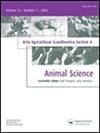Assessment of fecal microbiota in farmed silver fox (Vulpes vulpes fulva) and raccoon dog (Nyctereutes procyonoides)
IF 0.9
4区 农林科学
Q3 AGRICULTURE, DAIRY & ANIMAL SCIENCE
Acta Agriculturae Scandinavica Section A-Animal Science
Pub Date : 2018-07-03
DOI:10.1080/09064702.2019.1637451
引用次数: 2
Abstract
ABSTRACT The fox (Vulpes vulpes fulva) and raccoon dog (Nyctereutes procyonoides) are important farmed fur animals, but information on their intestinal microbiota is not known. In this study, the fecal microbiota of the fox and raccoon dog were thus analyzed. Total DNA was extracted from fecal samples, and the v4 16S rRNA gene amplicons were characterized on an Illumina MiSeq platform. A total of 1433 operational taxonomical units (OTUs) belonging to 18 bacterial phyla were identified. The most predominant phyla, Bacteroidetes, Firmicutes, Proteobacteria and Actinobacteria, were identified as the core microbiota, which was consistent with findings from other canids, such as the dog, wolf and dhole. Prevotella and Megasphaera were the major genera in both fox and raccoon dog. Even though the composition and ratio of genera varied between these two canids, their fecal microbial communities were similar to each other.养殖银狐(Vulpes Vulpes fulva)和貉(Nyctereutes procyonoides)粪便微生物群评价
狐(Vulpes Vulpes fulva)和貉(Nyctereutes procyonoides)是重要的养殖毛皮动物,但其肠道微生物群的信息尚不清楚。因此,本研究对狐狸和貉的粪便微生物群进行了分析。从粪便样本中提取总DNA,并在Illumina MiSeq平台上对v4 16S rRNA基因扩增子进行表征。共鉴定出18个细菌门1433个操作分类单元(OTUs)。主要菌群为拟杆菌门(Bacteroidetes)、厚壁菌门(Firmicutes)、变形菌门(Proteobacteria)和放线菌门(Actinobacteria),这与犬、狼和洞等其他犬科动物的发现一致。狐狸和貉的主要属为普雷沃菌属和巨孢子菌属。尽管两种犬科动物的属组成和比例不同,但它们的粪便微生物群落相似。
本文章由计算机程序翻译,如有差异,请以英文原文为准。
求助全文
约1分钟内获得全文
求助全文
来源期刊

Acta Agriculturae Scandinavica Section A-Animal Science
农林科学-奶制品与动物科学
CiteScore
2.30
自引率
0.00%
发文量
9
审稿时长
>36 weeks
期刊介绍:
Acta Agriculturæ Scandinavica, Section A – Animal Science publishes results of original research in animal science and their applications related to the following topics:
-Animal breeding and genetics
-Molecular genetics
-Animal physiology and reproduction
-Nutrition and feeding
-Animal behaviour and welfare
-General animal husbandry and systems of production, including economic and technical aspects
-Hygiene and quality of animal products
In addition to original articles, covering basic as well as applied subjects, the journal features review articles and short communications.
Acta Agriculturæ Scandinavica, Section A – Animal Science forms part of a trilogy of titles published on behalf of the Nordic Association of Agricultural Scientists (NJF). The series also includes Section B - Soil & Plant Science and the recently launched Section C - Food Economics .
Acta Agriculturae Scandinavica A, B and C are available to purchase as a combined subscription. This provides access to all three journals in the series, and is available to institutional subscribers only. For full pricing information, please view the Taylor & Francis Journals Price List here.
Scientists in research, teaching and extension with specialised interest in animal science and production.
 求助内容:
求助内容: 应助结果提醒方式:
应助结果提醒方式:


